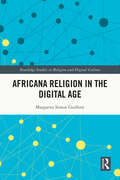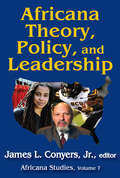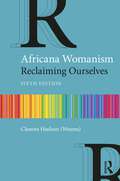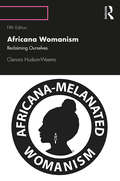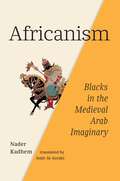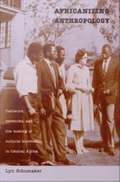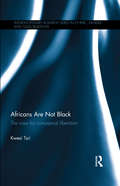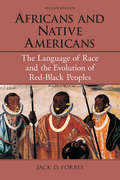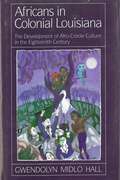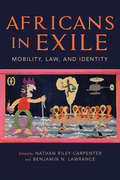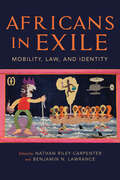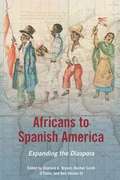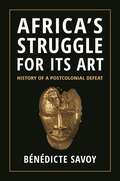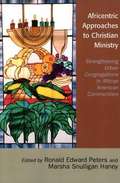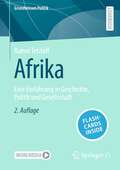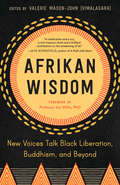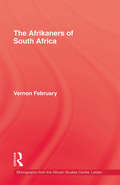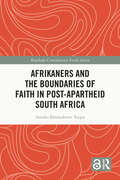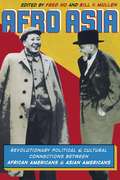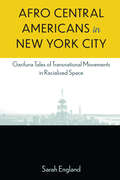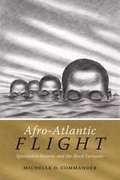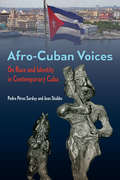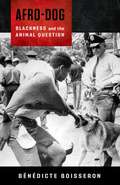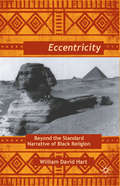- Table View
- List View
Africana Religion in the Digital Age (Routledge Studies in Religion and Digital Culture)
by Margarita Simon GuilloryThis book diversifies the fields of digital religion studies and Africana religious studies by considering the nuanced intersections between digital technologies and the religious experiences of African Americans. While Christianity is a continuous marker of religious identity for many African Americans, this digital approach to examining Africana religion in the US uncovers other non-Christian esoteric traditions that have often been marginalized within academia. The book explores the diverse ways that African Americans employ the Internet, social media, human enhancement technologies, and gaming to construct multidimensional modes of religious identities. It also considers the ways that Africana religious practitioners employ digital platforms to both complement and disrupt religious authority. Ultimately, the book establishes Africana religious experiences as viable entry points in the scholarly engagement of religion in the digital age. As such, it will be a key resource for scholars of Religious Studies, Africana Religious and Esoteric Studies, Religion and Culture and Religion and Sociology.
Africana Theory, Policy, and Leadership (Africana Studies)
by Jr. ConyersAfricana Theory, Policy, and Leadership is an eclectic work that examines Africana issues from multiple angles, including literature, ethnography, gender, aesthetics, and diversity. The contributors to this volume add unique and insightful works to the collection of research and writing documenting the pan-African experience. Conyers offers the reader an interdisciplinary approach to the study of people of African descent with special emphasis on the black population of the United States.This collection addresses a wide range of topics. "Africana Literature as Social Science" reviews the scholarship of August Wilson and Suzan Lori-Parks. "How Homeland Eritrea Monitors Its American Diaspora" analyses Eritrean government-diaspora tensions. "Toward Theorizing Gender without Feminism" and "Are Black Women the New Mules of the Prison Industrial Complex?" illustrates the double burden of race and gender borne by black women. "Africana Aesthetics" documents black life in post-Civil War Texas with photos. "Africana Studies and Diversity" explores the struggle to maintain athletic programs at historically black colleges. "The Africana Idea in Leadership Studies" offers an Afrocentric approach to the study of critical theory in leadership.This volume presents examples of Africana scholarship in major areas of work, including literature, politics, feminist studies, criminology, history, and sports studies, and is the most recent volume in Transaction's Africana Studies series.
Africana Womanism: Reclaiming Ourselves
by Clenora Hudson (Weems)The sixth edition of Africana Womanism provides important updates to the classic text in which Clenora Hudson (Weems) sets out a paradigm for women of African descent. Differentiating itself from the problematic theories of Western feminisms, Africana Womanism allows an establishment of cultural identity and relationship directly to ancestry and land. Introduced in the mid-1980s, Africana Womanism offers a new term and paradigm for women of African descent, a family-centered concept, prioritizing race, class, and gender. This new edition includes an Africana Womanist reading of Angie Thomas’ twenty-first-century novel, The Hate U Give, continuing existing Africana Womanist readings of twentieth-century novels by Hurston, Bâ, Marshall, Morrison, and McMillan; a Prologue, a previously unpublished interview with the author; a revised conclusion; updated bibliographies; an updated annotated bibliography; and a new section outlining key questions, clarifications, considerations, and commentaries surrounding Africana Womanism in relation to other female-based theories. Africana Womanism remains an important work and essential reading for researchers and students in women and gender studies, Africana studies, African American studies, literary studies, and cultural studies.
Africana Womanism: Reclaiming Ourselves
by Clenora Hudson (Weems)A classic in African American Studies and Gender Studies.Sixth edition will feature a new chapter discussing Angie Thomas' The Hate You Give.Outlines a novel, non-western notion of 'womanism' rather than 'feminism'.
Africana Womanism: Reclaiming Ourselves
by Clenora Hudson-WeemsFirst published in 1993, this is a new edition of the classic text in which Clenora Hudson-Weems sets out a paradigm for women of African descent. Examining the status, struggles and experiences of the Africana woman forced into exile in Europe, Latin America, the United States or at Home in Africa, the theory outlines the experience of Africana women as unique and separate from that of some other women of color, and, of course, from white women. Differentiating itself from the problematic theories of Western feminisms, Africana Womanism allows an establishment of cultural identity and relationship directly to ancestry and land. This new edition includes five new chapters as well as an evolution of the classic Africana womanist paradigm, to that of Africana-Melanated Womanism. It shows how race, class and gender must be prioritized in the fight against every day racial dominance. Africana Womanism: Reclaiming Ourselves offers a new term and paradigm for women of African descent. A family-centered concept, prioritizing race, class and gender, it offers eighteen features of the Africana womanist (self-namer, self-definer, family-centered, genuine in sisterhood, strong, in concert with male in the liberation struggle, whole, authentic, flexible role player, respected, recognized, spiritual, male compatible, respectful of elders, adaptable, ambitious, mothering, nurturing), applying them to characters in novels by Hurston, Bâ, Marshall, Morrison and McMillan. It evolves from Africana Womanism to Africana-Melanated Womanism. This is an important work and essential reading for researchers and students in women and gender studies, Africana studies, African-American studies, literary studies and cultural studies, particularly with the emergence of family centrality (community and collective engagement), the very cornerstone of Africana Womanism since its inception.
Africanism: Blacks in the Medieval Arab Imaginary
by Nader KadhemAnti-blackness has until recently been a taboo topic within Arab society. This began to change when Nader Kadhem, a prominent Arab and Muslim thinker, published the first in-depth investigation of anti-black racism in the Arab world in 2004. This translation of the new and revised edition of Kadhem’s influential text brings the conversation to the English-speaking world.Al-Istifraq or Africanism, a term that is analogous to Orientalism, refers to the discursive elements of perceiving, imagining, and representing black people as a subject of study in Arabic writings. Kadhem explores the narratives of Africanism in the Arab imaginary from the Middle Ages to the nineteenth century to show how racism toward black people is ingrained in the Arab world, offering a comprehensive account of the representations of blackness and black people in Arab cultural narratives – including the Quran, the hadith, and Arabic literature, geography, and history. The book examines the pejorative image of black people in Arab cultural discourse through three perspectives: the controversial anthropological concept that culture defines what it means to be human; the biblical narrative of Noah cursing his son Ham’s descendants – understood to be darker-skinned – with servitude; and Greco-Roman physiognomy, philosophy, medicine, and geography. Describing the shifting standards of inclusion that have positioned Arab identity in opposition to blackness, Kadhem argues that in the cultural imaginary of the Arab world, black people are widely conflated with the Other.Analyzing canonical Arabic texts through the lens of English, French, and German theory, Africanism traces the history of racism in Arab culture.
Africanizing Anthropology: Fieldwork, Networks, and the Making of Cultural Knowledge in Central Africa
by Lyn SchumakerAfricanizing Anthropology tells the story of the anthropological fieldwork centered at the Rhodes-Livingstone Institute in Northern Rhodesia (now Zambia) during the mid-twentieth century. Focusing on collaborative processes rather than on the activity of individual researchers, Lyn Schumaker gives the assistants and informants of anthropologists a central role in the making of anthropological knowledge. Schumaker shows how local conditions and local ideas about culture and history, as well as previous experience of outsiders' interest, shape local people's responses to anthropological fieldwork and help them, in turn, to influence the construction of knowledge about their societies and lives. Bringing to the fore a wide range of actors--missionaries, administrators, settlers, the families of anthropologists--Schumaker emphasizes the daily practices of researchers, demonstrating how these are as centrally implicated in the making of anthropological knowlege as the discipline's methods. Selecting a prominent group of anthropologists--The Manchester School--she reveals how they achieved the advances in theory and method that made them famous in the 1950s and 1960s. This book makes important contributions to anthropology, African history, and the history of science.
Africans Are Not Black: The case for conceptual liberation (Interdisciplinary Research Series in Ethnic, Gender and Class Relations)
by Kwesi TsriAfricans are not literally black, yet they are called black. Why? This book explores the genesis and evolution of the description of Africans as black, the consequences of this practice, and how it contributes to the denigration (blackening) and dehumanisation of Africans. It uses this analysis to advance a case for abandoning the use of the term ‘black’ to describe and categorise Africans. Mainstream discussions of the history of European racism have generally neglected the role of black and white colour symbolisms in sustaining the supposed superiority of those labelled white over those labelled black. This work redresses that neglect, by tracing the genesis of the conception of Africans as black in ancient Greece and its continued employment in early Christian writings, followed by an original, close analysis of how this use is replicated in three key representative texts: Shakespeare's Othello, the translation of the Bible into the African language Ewe, and a book by the influential Ghanaian religious leader, Mensa Otabil. It concludes by directly addressing the argument that ‘black’ can be turned into a positive concept, demonstrating the failure of this approach to deal with the real problems raised by imposing the term ‘black’ on its human referents.
Africans and Native Americans: The Language of Race and the Evolution of Red-Black Peoples
by Jack D. ForbesAfricans and Native Americans (the book) explores key issues relating to the evolution of racial terminology and European colonialists' perceptions of color, analyzing the development of color classification systems and the specific evolution of key terms such as black, mulatto, and mestizo, which no longer carry their original meanings. Jack Forbes presents strong evidence that Native American and African contacts began in Europe, Africa, and the Caribbean and that Native Americans may have crossed the Atlantic long before Columbus.
Africans in Colonial Louisiana: The Development of Afro-Creole Culture in the Eighteenth-Century
by Gwendolyn Midlo HallAlthough a number of important studies of American slavery have explored the formation of slave cultures in the English colonies, no book until now has undertaken a comprehensive assessment of the development of the distinctive Afro-Creole culture of colonial Louisiana. This culture, based upon a separate language community with its own folkloric, musical, religious, and historical traditions, was created by slaves brought directly from Africa to Louisiana before 1731. It still survives as the acknowledged cultural heritage of tens of thousands of people of all races in the southern part of the state. In this pathbreaking work, Gwendolyn Midlo Hall studies Louisiana's creole slave community during the eighteenth century, focusing on the slaves' African origins, the evolution of their own language and culture, and the role they played in the formation of the broader society, economy, and culture of the region. Hall bases her study on research in a wide range of archival sources in Louisiana, France, and Spain and employs several disciplines--history, anthropology, linguistics, and folklore--in her analysis. Among the topics she considers are the French slave trade from Africa to Louisiana, the ethnic origins of the slaves, and relations between African slaves and native Indians. She gives special consideration to race mixture between Africans, Indians, and whites; to the role of slaves in the Natchez Uprising of 1729; to slave unrest and conspiracies, including the Pointe Coupee conspiracies of 1791 and 1795; and to the development of communities of runaway slaves in the cypress swamps around New Orleans.
Africans in Exile: Mobility, Law, and Identity (Framing the Global)
by Nathan Riley Carpenter Benjamin N LawranceThe enforced removal of individuals has long been a political tool used by African states to create generations of asylum seekers, refugees, and fugitives. Historians often present such political exile as a potentially transformative experience for resilient individuals, but this reading singles the exile out as having an exceptional experience. This collection seeks to broaden that understanding within the global political landscape by considering the complexity of the experience of exile and the lasting effects it has had on African peoples. The works collected in this volume seek to recover the diversity of exile experiences across the continent. This corpus of testimonials and documents is presented as an "archive" that provides evidence of a larger, shared experience of persecution and violence. This consideration reads exiles from African colonies and nations as active participants within, rather than simply as victims of, the larger global diaspora. In this way, exile is understood as a way of asserting political dissidence and anti-imperial strategies. Broken into three distinct parts, the volume considers legal issues, geography as a strategy of anticolonial resistance, and memory and performative understandings of exile. The experiences of political exile are presented as fundamental to an understanding of colonial and postcolonial oppression and the history of state power in Africa.
Africans in Exile: Mobility, Law, and Identity (Framing the Global)
by Edited by Nathan Riley Carpenter and Benjamin N. Lawrance“This rich volume will interest scholars and students of Africa, the African diaspora, world history, legal history, and international affairs.” —Lorelle Semley, author of To Be Free and French: Citizenship in France’s Atlantic EmpireThe enforced removal of individuals has long been a political tool used by African states to create generations of asylum seekers, refugees, and fugitives. Historians often present such political exile as a potentially transformative experience for resilient individuals, but this reading singles the exile out as having an exceptional experience. This collection seeks to broaden that understanding within the global political landscape by considering the complexity of the experience of exile and the lasting effects it has had on African peoples.The works collected in this volume seek to recover the diversity of exile experiences across the continent. This corpus of testimonials and documents is presented as an “archive” that provides evidence of a larger, shared experience of persecution and violence. This consideration reads exiles from African colonies and nations as active participants within, rather than simply as victims of, the larger global diaspora. In this way, exile is understood as a way of asserting political dissidence and anti-imperial strategies.Broken into three distinct parts, the volume considers legal issues, geography as a strategy of anticolonial resistance, and memory and performative understandings of exile. The experiences of political exile are presented as fundamental to an understanding of colonial and postcolonial oppression and the history of state power in Africa.
Africans to Spanish America: Expanding the Diaspora
by Sherwin K. Bryant Rachel Sarah O'Toole Ben VinsonAfricans to Spanish America expands the diaspora framework to include Mexico, Peru, Ecuador, and Cuba, exploring the connections and disjunctures between colonial Latin America and the African diaspora in the Spanish empires. Analysis of the regions of Mexico and the Andes opens up new questions of community formation that incorporated Spanish legal strategies in secular and ecclesiastical institutions as well as articulations of multiple African identities. The volume is arranged around three sub-themes: identity construction in the Americas; the struggle by enslaved and free people to present themselves as civilized, Christian, and resistant to slavery; and issues of cultural exclusion and inclusion. Contributors are Joan Cameron Bristol, Nancy E. van Deusen, Leo Garafalo, Herbert S. Klein, Charles Beatty Medina, Karen Y. Morrison, Rachel Sarah O'Toole, Frank "Trey" Proctor, and Michele B. Reid.
Africa’s Struggle for Its Art: History of a Postcolonial Defeat
by Bénédicte SavoyA major new history of how African nations, starting in the 1960s, sought to reclaim the art looted by Western colonial powers For decades, African nations have fought for the return of countless works of art stolen during the colonial era and placed in Western museums. In Africa’s Struggle for Its Art, Bénédicte Savoy brings to light this largely unknown but deeply important history. One of the world’s foremost experts on restitution and cultural heritage, Savoy investigates extensive, previously unpublished sources to reveal that the roots of the struggle extend much further back than prominent recent debates indicate, and that these efforts were covered up by myriad opponents.Shortly after 1960, when eighteen former colonies in Africa gained independence, a movement to pursue repatriation was spearheaded by African intellectual and political classes. Savoy looks at pivotal events, including the watershed speech delivered at the UN General Assembly by Zaire’s president, Mobutu Sese Seko, which started the debate regarding restitution of colonial-era assets and resulted in the first UN resolution on the subject. She examines how German museums tried to withhold information about their inventory and how the British Parliament failed to pass a proposed amendment to the British Museum Act, which protected the country's collections. Savoy concludes in the mid-1980s, when African nations enacted the first laws focusing on the protection of their cultural heritage.Making the case for why restitution is essential to any future relationship between African countries and the West, Africa’s Struggle for Its Art will shape conversations around these crucial issues for years to come.
Africentric Approaches to Christian Ministry: Strengthening Urban Congregations in African American Communities
by Rosetta E. Ross J. Deotis Roberts Katie Geneva Cannon Warren L. Dennis Gayraud Wilmore Gloria J. Tate Marsha Snulligan Haney Ronald Edward Peters Richard C. Chapple Tumani Mutasa Nyajeka Johnnie Monroe Cain Hope Fielder Fred Douglas SmithIn a pluralistic world where the tendency is to dismiss or silence ethnic and racial differences, Africentric Approaches to Christian Ministry: Strengthening Urban Congregations in African American Communities offers invaluable insight into the ordering of urban congregational life, Christian ministry, and urban missiology from a worldview perspective that values the centrality of African people. Theological leaders and framers of African American religious studies, such as the following persons provide provocative insight for theological reflection and praxis: Gayraud Wilmore (The Black Church); J. Deotis Roberts (Africentric Christianity); Katie Geneva Cannon (Diaspora Ethics); and Cain Hope Fielder (New Testament Studies). The opening and closing chapters by co-editors Ronald Edward Peters and Marsha Snulligan Haney provide a critical knowledge base that frames Africentric Approaches to Christian Ministry. In light of the rapidly changing nature of Christianity globally (non-Western and non-European), this is a significant study on African American religious consciousness and urban praxis.
Afrika: Eine Einführung in Geschichte, Politik und Gesellschaft (Grundwissen Politik)
by Rainer TetzlaffDas Lehrbuch bietet auch in der 2. erweiterten und aktualisierten Auflage einen vertieften Überblick über Geschichte und Politik Afrikas, vom Sklavenhandel, über die Phasen von Kolonialismus und Dekolonisation bis zu den Entwicklungsproblemen der Gegenwart. Dabei werden diverse Entwicklungstheorien zur Erklärung von erfolgreichen und fehlgeschlagenen Entwicklungspfaden einzelner Länder nach 1960 herangezogen. Thematische Schwerpunkte sind Europas koloniales Erbe, Staatsbildung und Staatszerfall, Demokratisierung, Rohstoffpolitik, Bevölkerungswachstum, Hunger und Armut, Kriege und ethnische Konflikte sowie Weltbank, EU, China und Russland als externe Akteure in Afrika.Zusätzliche Fragen per App: Laden Sie die Springer Nature Flashcards-App kostenlos herunter, um Ihr Wissen zu prüfen.
Afrikan Wisdom: New Voices Talk Black Liberation, Buddhism, and Beyond
by Valerie Mason-JohnA spiritual, political, and interdisciplinary anthology of wisdom stories from Black liberation leaders and teachers.Afrikan Wisdom represents an intersectional, cross-pollinated exploration of Black life--past, present, and future. Award-winning author and editor Valerie Mason-John (Vimalasara)'s collection of 34 essays--written by an eclectic and inspirational group of Black thought leaders and teachers--reflects on the unique and multilayered experience of being Black in the world today. This anthology instills in readers the knowledge, awareness, validation, and spiritual tools necessary to nurture both individual and collective liberation. It is both an inspiration and a motivation for Black readers, as well as anyone else interested in reading about emerging spiritual voices. Topics include: • African and Afro-Diasporan cultures, histories, spiritualities, art, music, and literature • Black radical traditions of liberation and consciousness • Anticolonialism and antislavery • Buddhist philosophy • Social and environmental justice • The prison industrial complex and mass incarceration • (Kemetic) yoga, healing, and mindfulness • Intersections with Indigenous cultures • Addiction and recovery • Transgenerational trauma
Afrikaners Of South Africa
by FebruaryFirst Published in 1991. Routledge is an imprint of Taylor & Francis, an informa company.
Afrikaners and the Boundaries of Faith in Post-Apartheid South Africa (Routledge Contemporary South Africa)
by Annika Björnsdotter TeppoThis book examines the shifting moral and spiritual lives of white Afrikaners in South Africa after apartheid. The end of South Africa’s apartheid system of racial and spatial segregation sparked wide-reaching social change as social, cultural, spatial and racial boundaries were transgressed and transformed. This book investigates how Afrikaners have mediated the country’s shifting boundaries within the realm of religion. For instance, one in every three Afrikaners used these new freedoms to leave the traditional Dutch Reformed Church (NGK), often for an entirely new religious affiliation within the Pentecostal or Charismatic churches, or New Religious Movements such as Wiccan neopaganism. Based on long-term ethnographic fieldwork in the Western Cape area, the book investigates what spiritual life after racial totalitarianism means for the members of the ethnic group that constructed and maintained that very totalitarianism. Ultimately, the book asks how these new Afrikaner religious practices contribute to social solidarity and integration in a persistently segregated society, and what they can tell us about racial relations in the country today. This book will be of interest to scholars of religious studies, social and cultural anthropology and African studies.
Afro Asia: Revolutionary Political and Cultural Connetions Between African Americans and Asian Americans
by Fred Ho Bill V. MullenWith contributions from activists, artists, and scholars, Afro Asia is a groundbreaking collection of writing on the historical alliances, cultural connections, and shared political strategies linking African Americans and Asian Americans. Bringing together autobiography, poetry, scholarly criticism, and other genres, this volume represents an activist vanguard in the cultural struggle against oppression. Afro Asia opens with analyses of historical connections between people of African and of Asian descent. An account of nineteenth-century Chinese laborers who fought against slavery and colonialism in Cuba appears alongside an exploration of African Americans' reactions to and experiences of the Korean "conflict. " Contributors examine the fertile period of Afro-Asian exchange that began around the time of the 1955 Bandung Conference, the first meeting of leaders from Asian and African nations in the postcolonial era. One assesses the relationship of two important 1960s Asian American activists to Malcolm X and the Black Panthers. Mao Ze Dong's 1963 and 1968 statements in support of black liberation are juxtaposed with an overview of the influence of Maoism on African American leftists. Turning to the arts, Ishmael Reed provides a brief account of how he met and helped several Asian American writers. A Vietnamese American spoken-word artist describes the impact of black hip-hop culture on working-class urban Asian American youth. Fred Ho interviews Bill Cole, an African American jazz musician who plays Asian double-reed instruments. This pioneering collection closes with an array of creative writing, including poetry, memoir, and a dialogue about identity and friendship that two writers, one Japanese American and the other African American, have performed around the United States. Contributors: Betsy Esch, Diane C. Fujino, royal hartigan, Kim Hewitt, Cheryl Higashida, Fred Ho, Everett Hoagland, Robin D. G. Kelley, Bill V. Mullen, David Mura, Ishle Park, Alexs Pate, Thien-bao Thuc Phi, Ishmael Reed, Kalamu Ya Salaam, Maya Almachar Santos, JoYin C. Shih, Ron Wheeler, Daniel Widener, Lisa Yun
Afro Central Americans in New York City: Garifuna Tales of Transnational Movements in Racialized Space
by Sarah EnglandDescended from African maroons and the Island Carib on colonial St. Vincent, and later exiled to Honduras, the Garifuna way of life combines elements of African, Island Carib, and colonial European culture. Beginning in the 1940s, this cultural matrix became even more complex as Garifuna began migrating to the United States, forming communities in the cities of New York, New Orleans, and Los Angeles. Moving between a village on the Caribbean coast of Honduras and the New York City neighborhoods of the South Bronx and Harlem, England traces the daily lives, experiences, and grassroots organizing of the Garifuna.Concentrating on how family life, community life, and grassroots activism are carried out in two countries simultaneously as Garifuna move back and forth, England also examines the relationship between the Garifuna and Honduran national society and discusses much of the recent social activism organized to protect Garifuna coastal villages from being expropriated by the tourism and agro-export industries.Based on two years of fieldwork in Honduras and New York, her study examines not only how this transnational system works but also the impact that the complex racial and ethnic identity of the Garifuna have on the surrounding societies. As a people who can claim to be Black, Indigenous, and Latino, the Garifuna have a complex relationship not only with U.S. and Honduran societies but also with the international community of nongovernmental organizations that advocate for the rights of Indigenous peoples and blacks.Publication of the paperback edition made possible by a Sustaining the Humanities through the American Rescue Plan grant from the National Endowment for the Humanities.
Afro-Atlantic Flight: Speculative Returns and the Black Fantastic
by Michelle D. CommanderIn Afro-Atlantic Flight Michelle D. Commander traces how post-civil rights Black American artists, intellectuals, and travelers envision literal and figurative flight back to Africa as a means by which to heal the dispossession caused by the slave trade. Through ethnographic, historical, literary, and filmic analyses, Commander shows the ways that cultural producers such as Octavia Butler, Thomas Allen Harris, and Saidiya Hartman engage with speculative thought about slavery, the spiritual realm, and Africa, thereby structuring the imaginary that propels future return flights. She goes on to examine Black Americans’ cultural heritage tourism in and migration to Ghana; Bahia, Brazil; and various sites of slavery in the US South to interrogate the ways that a cadre of actors produces “Africa” and contests master narratives. Compellingly, these material flights do not always satisfy Black Americans’ individualistic desires for homecoming and liberation, leading Commander to focus on the revolutionary possibilities inherent in psychic speculative returns and to argue for the development of a Pan-Africanist stance that works to more effectively address the contemporary resonances of slavery that exist across the Afro-Atlantic.
Afro-Cuban Voices: On Race and Identity in Contemporary Cuba (Contemporary Cuba)
by Jean Stubbs Pedro Pérez SarduyFrom the forewords: "At a time when Cuba is undergoing immense economic and social changes, race becomes a kind of cultural litmus test for the national identity. . . . This anthology illustrates fully that it is possible to be both revolutionary and black in Cuba."—Manning Marable, Columbia University "The authors of Afro-Cuban Voices, also key actors in the new, unfolding dialogue about race in Cuba, make a seminal contribution through a forthright critique of ‘racial blind spots’ in official history and present-day racial discrimination."—James Early, director of cultural studies and communication, Smithsonian Institution From the series editor: "A courageous attempt to deal head-on with the issue of race in Cuba today. . . . Pérez Sarduy and Stubbs [seek to] put a human face on this debate, and do so well. The book will be received with relief by some and with frustration by others. Controversial it will undoubtedly be, since—as with most things Cuban—strong emotions are a given assumption. It will be an admirable beginning for the series and, it is hoped, will spark a much-needed debate in the United States on many aspects of the ‘Cuban question.’ It is about time."—John M. Kirk Based on the vivid firsthand testimony of prominent Afro-Cubans who live in Cuba, this book of interviews looks at ways that race affects daily life on the island. While celebrating their racial and national identity, the collected voices express an urgent need to end the silences and distortions of history in both pre- and postrevolutionary Cuba. The 14 people interviewed—of different generations and from different geographic areas of Cuba—come from the arts, the media, industry, academia, and medicine. They include a doctor who calls for joint U.S.-Cuban studies on high blood pressure and a craftsman who makes the batá drums used in Yoruba worship ceremonies. All responded to four controversial questions: What is it like to be black in Cuba? How has the revolution made a difference? To what extent is that difference true today? What can be done? Exposing the contradictions of both racial stereotyping and cultural assimilation, their eloquent answers make the case that the issue of race in Cuba, no matter how hard to define, will not be ignored. A volume in the series Contemporary Cuba, edited by John M. Kirk
Afro-Dog: Blackness and the Animal Question
by Bénédicte BoisseronThe animal-rights organization PETA asked “Are Animals the New Slaves?” in a controversial 2005 fundraising campaign; that same year, after the Humane Society rescued pets in the aftermath of Hurricane Katrina while black residents were neglected, some declared that white America cares more about pets than black people. These are but two recent examples of a centuries-long history in which black life has been pitted against animal life. Does comparing human and animal suffering trivialize black pain, or might the intersections of racialization and animalization shed light on interlinked forms of oppression?In Afro-Dog, Bénédicte Boisseron investigates the relationship between race and the animal in the history and culture of the Americas and the black Atlantic, exposing a hegemonic system that compulsively links and opposes blackness and animality to measure the value of life. She analyzes the association between black civil disobedience and canine repression, a history that spans the era of slavery through the use of police dogs against protesters during the civil rights movement of the 1960s to today in places like Ferguson, Missouri. She also traces the lineage of blackness and the animal in Caribbean literature and struggles over minorities’ right to pet ownership alongside nuanced readings of Derrida and other French theorists. Drawing on recent debates on black lives and animal welfare, Afro-Dog reframes the fast-growing interest in human–animal relationships by positioning blackness as a focus of animal inquiry, opening new possibilities for animal studies and black studies to think side by side.
Afro-Eccentricity: Beyond the Standard Narrative of Black Religion
by William David HartAfro-Eccentricity explores three overlapping stories of Black Religion: the Soul, Black Church, and Ancestor Narratives. Hart contends that these narratives dominate most accounts of Black Religion that, collectively, he calls the "Standard Narrative of Black Religion. "
